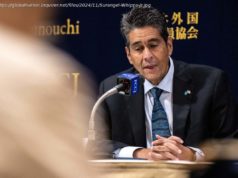China will be a major factor in conversations between Trump and South Korea’s Moon when they meet later this week and discuss North Korea.
China will be a major factor in conversations between President Donald Trump and South Korean President Moon Jae-in when they meet this week and attempt to unify against North Korea.
The world’s second-largest economy has significant clout over both the rogue state and the U. S. ally that form the Korean peninsula. Well over two-thirds of North Korea’s trade is with China, while China imports more from South Korea than any other country.
« I would probably focus a little more on the Chinese at this point, » said Ian Bremmer, head of consulting firm Eurasia Group. The South Koreans « don’t want to alienate the Chinese. »
« There’s a possibility this won’t go well, » Bremmer said. The « worst plausible scenario is South Korea tries to stay in the middle and makes nobody happy. »
China is not afraid to use its influence on the Korean peninsula to protect its interests against the U. S., which is in the process of deploying a missile defense system in South Korea. Beijing says the system is a security threat and has retaliated against major South Korean businesses.
« I think Moon wants to establish a good, working relationship with Trump, but they have some different ideas, » said Robert Manning of The Atlantic Council.
Trump and Moon are set to meet for the first time Thursday and Friday at the White House.
Moon was elected in early May, ending months of leadership uncertainty in the country after President Park Geun-hye was impeached and arrested for alleged corruption. Moon campaigned on taking a more conciliatory tone in dealing with North Korea and earlier this month officially suspended deployment of the Terminal High Altitude Area Defense system, or Thaad.
Trump clashed with South Korea in an April interview with Reuters by saying the country should pay for the $1 billion Thaad system. Trump also said the U. S. should renegotiate or terminate its trade deal with South Korea.
The « South Korean government doesn’t want Thaad to be the official agenda for the summit meeting, » said Hyun-Wook Kim, professor at the Korea National Diplomatic Academy in Seoul.
He’s watching whether the key missile defense program and flashpoint for China will even be part of Moon’s and Trump’s joint statement.
Meanwhile, Trump is reportedly growing increasingly frustrated with China. His relationship with Beijing had improved after Chinese President Xi Jinping visited in April, but Trump still threatened to use trade policy to get China to act on North Korea.
Trump « seems to have over-estimated his personal bond with Mr. Xi, » The Economist said in its June 24 issue. The President is « telephoning [Xi] so often to ask about Korea co-operation that Chinese officials grumbled to American contacts that their president is ‘not our North Korean desk officer.' »
On June 20, Trump tweeted that « while I greatly appreciate the efforts of President Xi & China to help with North Korea, it has not worked out. »
Analysts also worry that Trump may disrupt the meeting with tweets, or a cold persona as was the case in his meeting with German Chancellor Angela Merkel.
« With the North Korean security threat looming larger and larger, good chemistry between President Moon Jae-in and President Trump is essential, » Thomas Byrne, president of The Korea Society in New York.
The U. S. and South Korea do agree that China is important in working towards North Korea denuclearization.
« In principle, I think they can get along as far as North Korea is concerned, » Hyun-Wook Kim said. Moon « understands this is not the right time for dialogue. »
Last Monday, U. S. college student Otto Warmbier died at age 22, just days after being released in a coma by North Korea. Warmbier was arrested during a trip early last year to North Korea and was sentenced to 15 years in prison with hard labor under conviction of subversion.
Meanwhile, the number of missile tests has increased under dictator Kim Jong Un. From the beginning of this year to May 29, North Korea has held eight successful missile tests and four failed ones, according to the James Martin Center for Nonproliferation Studies at Middlebury. The database only tracks missile tests capable of delivering a nuclear weapon.
North Korea watchers say every test is worrisome since it gives the dictator state the opportunity to improve its nuclear weapons program.
North Korean missile tests this year
Source: James Martin Center for Nonproliferation Studies North Korea Missile Test Database, funded by Nuclear Threat Initiative.
Analysts also note Beijing would prefer not having to deal with an influx of refugees from a collapsed North Korean state. The rogue state also serves as a buffer with U. S. troops stationed in South Korea.
Bremmer said China could « absolutely » do more to stop North Korea from developing nuclear weapons. « They could squeeze North Korea more if they want, but they don’t in part because they think Trump is dangerous, » Bremmer said.
China has already taken some steps against North Korea, including temporary suspension of coal imports from the state. On Wednesday, Reuters reported, citing three sources, that China National Petroleum suspended sales of fuel to North Korea due to worries the state-owned oil company won’t get paid.
« These dynamics suggest that North Korea is an increasingly risky strategic asset [for China] , in view of the recalcitrance of the [Kim Jong Un] leadership and the precariousness of its finances and economy, » Byrne said. « I expect more pressure from China. »






